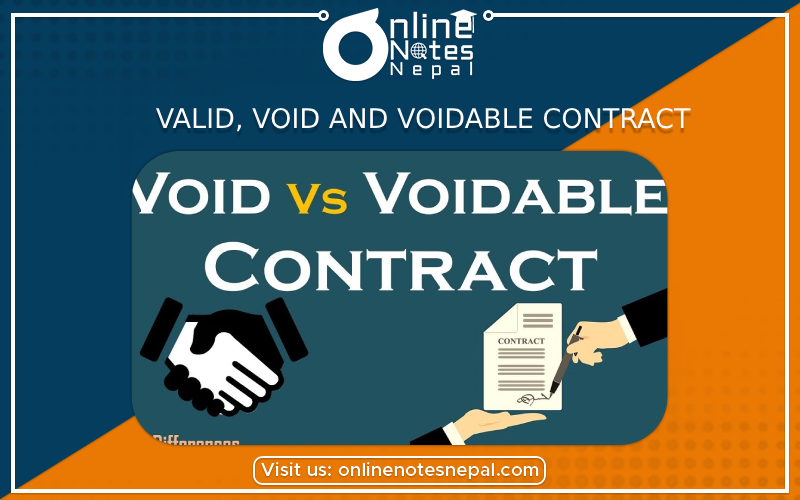Published by: Anu Poudeli
Published date: 02 Aug 2023

Contracts are a necessary component of our legal and corporate systems. They aid in the establishment of mutual obligations and expectations between parties, so giving a framework for conducting business and settling disputes. Contracts are divided into three types: valid, void, and voidable contracts.
Let's take a closer look at each one:
Contract is valid:
A valid contract is one that is legally enforceable between two or more parties and has all of the fundamental features required by law. A contract must satisfy the following key elements in order to be valid:
a. Offer and Acceptance: One party must make a clear and unambiguous offer, and the other party must accept that offer unconditionally.
b. Intention to Form Legal Relations: The parties must intend to form legally bound relations.
c. Consideration: As part of the contract, the parties should exchange something of value (e.g., money, commodities, services).
d. Capacity: The contracting parties must have the legal capacity to do so (i.e., they must be of sound mind and not minors or incompetent).
e. Free Consent: The parties' consent must be freely offered, without compulsion, undue influence, or misrepresentation.
f. Legal Object: The contract's subject matter must be legal and not contrary to public policy.
If all of these characteristics are present, the contract is considered legitimate, and the parties are legally bound to perform their contractual commitments.
Void Contract
A void contract is one that lacks legal force from the start. It is not legally enforceable, and it is as if the contract never occurred. A contract can be declared void for a variety of reasons, including:
a. Illegality: The contract's subject matter or aim is illegal or contrary to public policy.
b. Incapacity: If one or more parties lack the legal capacity to engage into the contract (for example, a minor or a mentally incapacitated person), the contract is null and void.
c. Error: If the contract is founded on a fundamental error that goes to the heart of the agreement, it may be deemed void.
d. Misrepresentation: The contract may be void if one party makes a serious misrepresentation that encourages the other party to enter into it.
e. Duress: If one party is coerced by duress into entering into the contract, the contract may be void.
Contract that is void:
A voidable contract is one that is initially lawful and enforceable, but one or more parties may void or terminate the contract owing to certain defects or conditions. A voidable contract, unlike a void contract, stays valid until one of the parties chooses to void it.
The following are common reasons for a contract to be voidable:
a. Lack of Free Consent: If consent was obtained through fraud, undue influence, or misrepresentation, the injured party has the option to terminate the contract.
b. Error: If there is a mistake that is not fundamental to the contract but significantly affects the terms, the injured party may seek to void the contract.
c. Minors: Contracts entered into by minors (those under the age of majority) are normally voidable at the minor's discretion.
d. Incapacity: Contracts made by mentally incapacitated people may be voidable.
It is crucial to remember that, depending on the jurisdiction, the process of voiding a contract is subject to certain legal procedures and time constraints.
To summarize, individuals and organizations must grasp the distinctions between valid, void, and voidable contracts in order to ensure that their agreements are legally enforceable and safeguarded from any challenges. When engaging into complex contractual arrangements, it is always advisable to seek legal assistance in order to prevent pitfalls and preserve your rights and interests.